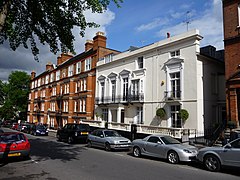Hampstead Village
| Hampstead | |
|---|---|
 Downshire Hill |
|
| Hampstead shown within Greater London | |
| OS grid reference | TQ265855 |
| London borough | |
| Ceremonial county | Greater London |
| Region | |
| Country | England |
| Sovereign state | United Kingdom |
| Post town | LONDON |
| Postcode district | NW3 |
| Dialling code | 020 |
| Police | Metropolitan |
| Fire | London |
| Ambulance | London |
| EU Parliament | London |
| UK Parliament | |
| London Assembly | |
Hampstead (/ˈhæmpstɪd/ or /-stɛd/), commonly known as Hampstead Village, is an area of London, England, 4 miles (6.4 km) northwest of Charing Cross. Part of the London Borough of Camden, it is known for its intellectual, liberal, artistic, musical and literary associations and for Hampstead Heath, a large, hilly expanse of parkland. It has some of the most expensive housing in the London area. The village of Hampstead has more millionaires within its boundaries than any other area of the United Kingdom.
The name comes from the Anglo-Saxon words ham and stede, which means, and is a cognate of, the Modern English "homestead".
Early records of Hampstead can be found in a grant by King Ethelred the Unready to the monastery of St. Peter's at Westminster (AD 986), and it is referred to in the Domesday Book (1086) as being in the hundred of Ossulstone.
The growth of Hampstead is generally traced back to the 17th century. Trustees of the Well started advertising the medicinal qualities of the chalybeate waters (water impregnated with iron) in 1700. Although Hampstead Wells was initially most successful and fashionable, its popularity declined in the 1800s due to competition with other fashionable London spas. The spa was demolished in 1882, although a water fountain was left behind.
Hampstead started to expand following the opening of the North London Railway in the 1860s (now the London Overground with passenger services operated by Transport for London), and expanded further after the Charing Cross, Euston & Hampstead Railway opened in 1907 (now part of London Underground's Northern line) and provided fast travel to central London.
...
Wikipedia

